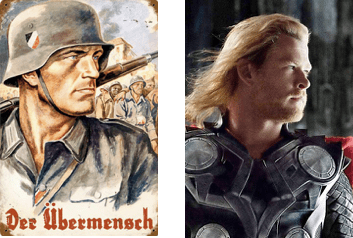
The creation of narrative is as integral to our functioning as breathing or sleeping. Narrative is the foundation of our two most basic behaviors, hunting, and the dual process of identity formation and socialization.
In hunting, it is necessary to create a story about how the prey behaves and what it is likely to do. A footprint in the mud becomes the fulcrum in a story about what was there in the past and where it will be in the future. In addition, there is the story of what the prey is thinking or feeling. The more you inhabit the mind of your prey the more effective you are as a hunter.
Often the narrative goes even further into a mythological arena where hunting an animal has cosmic meaning pertaining to souls or supernatural forces. Our narrative nature has practical roots but easily expands to epic proportions.
In identity formation, we weave together the individual memories of our lives into a web that supports our current situation and tries to predict our future. Our inner narrative is endlessly edited and reedited to support our sense of who we are and where we are going. A teenager fails a math test and he or she will fit the event into a string of events that prove something about his or her relationship to math. The teacher will generate a narrative as well, and so will the teen’s parents and friends. All of the stories are attempts at justifying the failure and predicting future performance. The veracity of the stories we weave doesn’t necessarily have any bearing over their influence. Truth or accuracy doesn’t enter into it.
This shared story writing is how identity formation crosses paths with socialization. You are not the only one writing your story. Before you were born there were stories being made anticipating your gender, your appearance, and even how you will behave. Once you are out of the womb every move you make, every expression you convey is translated into a story to help form who you are.
Whether in the form of a science experiment, a book, film, play, YouTube video, or tweet we are all story writers and story consumers. At their most basic, stories boil down to something existential. They deal with our most foundational belief, the one that all other beliefs are predicated on. It is a belief in cause and effect. Without this belief nothing else is possible.
It is through cause and effect that we derive a sense of agency. We are able to affect the world around us and so create meaning. The creation of a story is the attempt to understand why and how one event leads to another, and to reassure ourselves that in fact events are connected.
The reason we tell and retell stories about cause and effect is that the connection between the two is problematic. In absolute terms, there is no way to prove there is a necessary connection between cause and effect. If I let go of a ball and it falls to the ground instead of sitting in mid-air what does this prove? Proving that there is a connection between my dropping the ball and it falling is not possible. Repeating the action only establishes a statistical likelihood. The theory of gravity gives a plausible narrative explaining why it happens but it remains a narrative, not proof.

This may seem like a technicality but it is the unnerving foundation from which we work. We are never truly sure about the outcome of any action. It is reassuring to hear stories where things work in predictable ways. Even in a narrative with a surprising outcome, there is still the reassurance that one event leads to another. Whether it is Shakespeare or Sponge Bob, the nature of the story is still the same. We want to prove that there is a connection between events and that we can affect the outcome.

If we can link cause and effect then we literally can make a difference. Our ability to change things leads to the second foundational belief which is that our lives have meaning. Since there are consequences that result from our actions those actions are deemed meaningful. Narratives prove we have agency and through that agency comes meaning, but just as cause and effect can not be conclusively linked our actions can not be deemed meaningful simply because they affect change.
You can tell a story about the events leading up to your getting fired and the resulting consequences but you will fall into a quagmire if you try to assign it meaning. Of course, it is this quagmire that further fuels our urges to construct narratives and to try to glean from them a sense of purpose. Even Sisyphus’ meaningless labor is given purpose by it’s being a punishment. Sisyphus’ existence may seem pointless but there is a story behind it that imbues it with meaning. Look further and the story confirms cause and effect. Not only is Sisyphus able to move the rock, but there is also a narrative that explains the actions he took that resulted in this punishment. His actions may be fruitless but they have a purpose.

Humans continually create stories but strangely once a story is brought into existence we often divorce ourselves from its creation. The story becomes an entity unto itself. Once the story is woven the fabric often locks into place and is no longer a project or process it is now a product, an object, independent from its creator.
We create stories and then those stories turn around and create us. Race is a story someone wove. A story about how humans can be divided into groups and how those groups compete. Once this narrative was set loose it lost its identity as a story and became what many people saw as fact. They believed that race was an independent force that acted upon us instead of a creation we set in motion. Over time the fiction becomes the basis for an entire way of life and identity formation. The story is accepted, followed, and turned from fiction into something that feels like reality.
A far more direct and simple example is God. God is almost a literal expression of this phenomenon. We create God and then believe that he created us. We write the narrative and then it becomes the lens through which we see the world. Not only that but we eventually lose sight of the lens, we forget it exists and so we believe the story we have written is true.

Storytelling is necessary for our survival. Without a sense of a beginning, middle, and an end, without the resulting concept of time, we could not learn. As one of the slower, weaker creatures on this planet we have become careful observers. We use what we observe to construct narratives that will guide us. We remember the story of when a tribemate met a tiger and we use that story of that past experience to guide our future actions. This way the experience of one can teach an entire group. The nature of a story invites the author to share what he or she has created.
Without narrative, we could not exist. This statement itself is an implied narrative. Our existence is an idea and a feeling generated by our awareness of the past as well as our future. Whether it is a personal story or a collective story the writing and sharing of these stories are what makes our lives possible. It is so integral to who we are, even when we are asleep our mind continues creating stories in our dreams. It never ceases.

If you enjoyed this article click here for more
www.filmofileshideout.com/archives/a-brief-rant-about-my-cinema-students-and-american-optimism




The examples and explanations are wonderful. Often, when I am trying to convey the power of narrative to students, I tend to fall flat, and I think your writing is not only faithful to the core of narrative but is accessible. I wouldn't mind using this for a class, if that is okay. I think I have a space for it in my Lit 126 course and/or my composition courses.
CCC Professor
[…] If you enjoyed this article click here for morewww.filmofileshideout.com/archives/the-nature-of-narrative […]